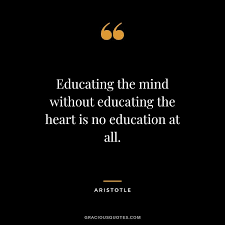Philosophy is Life and a Way of Life
Philosophy as Forceful Critique to the Rising Trend of Extractive Capitalism and Profit-Driven Consumerism in the Contemporary Educational System

All Global Research articles can be read in 51 languages by activating the Translate Website button below the author’s name (only available in desktop version).
To receive Global Research’s Daily Newsletter (selected articles), click here.
Click the share button above to email/forward this article to your friends and colleagues. Follow us on Instagram and Twitter and subscribe to our Telegram Channel. Feel free to repost and share widely Global Research articles.
Global Research Referral Drive: Our Readers Are Our Lifeline
First published on April 6, 2024
***
 Philosophy Reaching Insight into the Nature of Reality
Philosophy Reaching Insight into the Nature of Reality
One crucial and relevant aspect of Philosophy as an academic inquiry is the fact that Philosophy engages our ordinary experience as an entry point venue, as a stepping-stone, and as a vehicle towards reaching insight into the nature of Reality.
Philosophy engages even the most ordinary, the most down-to-earth, the most mundane, and simplest experience of life as a diving board to reach what Plato called the logos (the essential principle) of Reality and what Aristotle termed the telos (ultimate end or absolute purpose) of Life and Existence.
Right image: Aristotle
It is in this thought that Philosophy is referred to as a transcendental subject in and of itself.
Philosophy looks at the wholeness of things instead of partiality or particularity.
 Philosophy seeks a unitive and holistic understanding of things instead of looking at things from the point of view of separateness and divisiveness.
Philosophy seeks a unitive and holistic understanding of things instead of looking at things from the point of view of separateness and divisiveness.
There are many intellectual fields or subjects of academic endeavors that elucidate their respective discipline by making categories, particularizations, and distinctions in order to explain what for them constitutes Reality (be it social reality, political reality, constructed reality, or even metaphysical reality itself); however, Philosophy as a synthesizing discipline sees Reality as unitive, as a seamless whole, as a complete and comprehensive totality—hence
Philosophy by its very nature looks at the world exhaustively and holistically.
The Ultimate Reality from the positionality and perspective of Philosophy is first and foremost through-and-through unitive before it is divided into particularities, distinctiveness, or separateness.
Philosophy Looks at Absolute Truth
Philosophy looks at Absolute Truth as undivided whole and essentially unitive:
hence Philosophy cannot help but be holistic and synthetic (approaching the view of synthesis) in its view of things and events—and philosophers are also expected to look at the world, things, events, and indeed our total ecosystem from a tolerant perspective of an all-embracing synthesis and comprehensive wholeness.
Philosophy and Consumerism
There is a growing trend and a latent tendency in our contemporary educational system to see education as merely positivistic, scientistic, hyper-empiricistic, utilitarian, extractive, and instrumentalist.

The present profit-oriented, consumeristic, and capitalistic rising trend of our present educational system is to glorify what the ancient Sophists call teknike (the “how to” of things) rather than the ethike which is the discourse of ideal philosophical and ethical principles.
The Contemporary Academic System: Utilitarian and Instrumentalist
 The contemporary academic system is geared towards a utilitarian, instrumentalist, pragmatic approach to education that caters only to the utility of our present capitalist and consumerist economic setup. The purpose of contemporary education in our day and age is simply to supply workers to First World markets and laborers in the capitalistic corporatocratic cog.
The contemporary academic system is geared towards a utilitarian, instrumentalist, pragmatic approach to education that caters only to the utility of our present capitalist and consumerist economic setup. The purpose of contemporary education in our day and age is simply to supply workers to First World markets and laborers in the capitalistic corporatocratic cog.
Many educational systems in the Third World are right now mainly focusing in their academic syllabi and emphasizing in their curriculum the utility and marketability of their graduates to supply the intellectual, technical, and labor force to the capitalist corporations and consumerist economic outfits of First World countries.
If capitalistic productivity and consumeristic profiteering are to be the present focus and emphasis of our contemporary educational system, then Philosophy is simply counterproductive, passe, and totally irrelevant for an extractive capitalistic and corporatocratic educational system: since there is no utilitarian need of philosophers in the world of “get” and in the culture of accumulation: and no need for philosophical critique, rigorous reflection, and intellectual reflexivity in a commodified world whose emphasis is frenzied profitable action and unthinking compliance to the greedy demands of capitalistic corporatocracies.
Philosophy and Humanistic Education
 And yet, Philosophy is very crucial and relevant discipline if we are to establish a humanistic education since it is Philosophy that puts the “mind, heart, and soul” as well as humanness, humane-ness, and proper humanity to the human person.
And yet, Philosophy is very crucial and relevant discipline if we are to establish a humanistic education since it is Philosophy that puts the “mind, heart, and soul” as well as humanness, humane-ness, and proper humanity to the human person.
It is Philosophy that informs the human person of his or her unrepeatable, irreducible, irreplaceable, and unique worth in the midst of the commodifying and objectifying hold of a profiteering capitalism, consumerism, and avaricious corporatocracy on humans and on human relationships.
It is Philosophy that guides the human person who is in search of ethical and spiritual authenticity in the midst of this glittering world of money and this oppressive world of power-mongering and influence-peddling. It is Philosophy that allows humans to be in awe at Life with the view of knowing himself or herself in relation to others and the world.
By emphasizing on the consumeristic, positivistic, instrumentalist, utilitarian, extractive, and pragmatic demands of capitalist-oriented education, the relevance of Philosophy may diminish in the eyes of present academic curriculum makers, and it may vanish in the General Education courses and syllabi of profit-oriented capitalistic universities and other same-minded academic institutions—and God forbid, Philosophy as a subject or course may not be offered anymore in the academic prospectus of many educational institution in our day and age. But who will be at a loss? It will be the students themselves: and eventually, our present societies will intellectually be at a loss; since the ultimate goal of Philosophy is to be the venue for the authentic humanization of students so that they will become persons of wholeness for the sake of themselves, for others, for the world, and for the ecosystem.
Philosophy is Life Itself
It may be that Philosophy will not anymore be offered as an academic subject or course in the universities in the near future—and yet it will not be the death of Philosophy for Philosophy is, properly speaking, NOT just an academic discipline.
Philosophy is LIFE itself: and for as long as there are people who longs for authenticity in their very own existence and who continually wonder, question, and search for the raison d’ être of their life and being in the Greater Scheme of Things, for as long as there are still people who are not jaded to Life, but are continually amazed at the beauty of what Life has to offer, for as long as there are persons who want to be living sacrifice to the Altar of True Wisdom so they can expend and offer their lives for the good of humanity and for service to the world, then assuredly, Philosophy is here to stay, and will definitely be always here to stay.
Our capitalistic, monetarily extractive, and profit-driven contemporary educational system can never extinguish the ever-illuminating Torch of Wisdom, which is Philosophy itself.
Philosophy is Life and it is more expansive, more comprehensive, and more exhaustive than mere theorizing learned by rote, or plain memorizing, or by the relentless conditioning wrought by this consumer-crazed capitalistic education of today.
Philosophy Is Life and a Way of Life
As sure as the sun rises in the East, it can be certainly vouched—Philosophy as Life and as a way of Life is sure to stay for as long as there are authentic humans who are in earnest search for Life’s significance, who are in awe of Life’s bittersweet reality, and who longs for wholeness and genuineness in the midst of this modern world of extractive utilitarianism, instrumentalism, objectification, and commodification of humans, of both abiotic and biotic components of our ecosystem by the profit-driven capitalism and consumerism in our present corporatocratic educational system.

*
Note to readers: Please click the share button above. Follow us on Instagram and Twitter and subscribe to our Telegram Channel. Feel free to repost and share widely Global Research articles.
Prof. Henry Francis B. Espiritu is Associate Professor-7 of Philosophy and Asian Studies at the University of the Philippines (UP), Cebu City, Philippines.
He was Academic Coordinator of the Political Science Program at UP Cebu from 2011-2014, and Program Coordinator of Gender and Development (GAD) Office at UP Cebu from 2015-2016 and from 2018-2019.
His research interests include Theoretical and Applied Ethics, Islamic Studies particularly Sunni jurisprudence (Sunni Fiqh), Islamic feminist discourses, Islam in interfaith dialogue initiatives, Islamic environmentalism, Classical Sunni Islamic pedagogy, the writings of Al-Ghazali on pluralism and tolerance, Islam in the Indian Subcontinent, Turkish Sufism, Ataturk Studies, Ottoman Studies, Genghis Khan Studies, Marxian Political Thought, Muslim-Christian Dialogue, Middle Eastern Affairs, Peace Studies, Public Theology, and Postmodernism in Philosophy.
He is a Research Associate of the Centre for Research on Globalization (CRG) Canada.
Featured image is from Shutterstock

